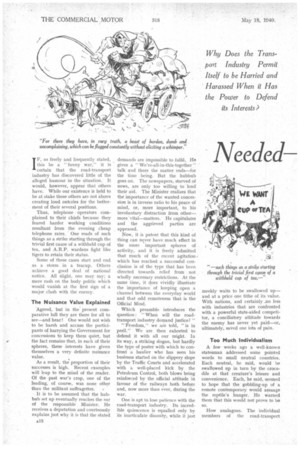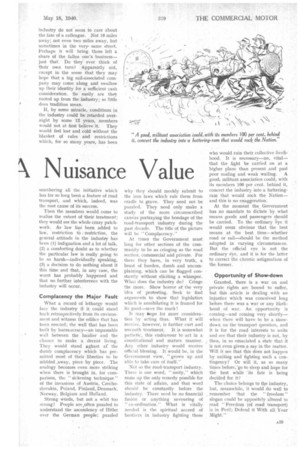Needed \ Nuisance Value
Page 20

Page 21

If you've noticed an error in this article please click here to report it so we can fix it.
IF, as freely and frequently stated, this be a "funny war," it is certain that the road-transport industry has discovered little of the alleged humour in the situation. It would, however, appear that others have. While our existence is held to be at stake these others are not above creating loud outcries for the betterment of their several positions.
Thus, telephone operators complained to their chiefs because they feared harder working conditions resultant from the evening cheap telephone rates. One reads of such things as a strike starting through the trivial first cause of a withheld cup of tea, and A.R.P. wardens fight like tigers to retain their status.
Some of these cases start and end as a storm in a teacup. Others achieve a good deal of national notice. All slight, one may say; a mere rash on the body politic which would vanish at the first sign of a major clash with the enemy.
The Nuisance Value Explained Agreed, •but in the present comparative lull they are there for all to see—and hear ! One would not wish to be harsh and accuse the participants of harrying the Government for concessions to keep them quiet, but the fact remains that, in each of their spheres, these interests have given themselves a very definite nuisance value.
As a result, the proportion of their successes is high. Recent examples will leap to the mind of the reader. Of the past war's crop, one of the leading, of course, was none other than the militant suffragettes.
It is to be assumed that the hubbub set up eventually reaches the ear of the responsible Minister. He receives a deputation and courteously explains just why it is that the stated demands are impossible to fulfil. He gives a " We're-all-in-this-together " talk arid there the matter ends—for the time being. But the hubbub goes on. The newspapers, starved of news, are only too willing to lend their aid. The Minister realizes that the importance of the wanted concession is in inverse ratio to his peace of mind, or, more important, to his involuntary distraction from other— more vital—matters.' He capitulates and the aggrieved parties are appeased.
Now, it is patent that this kind of thing can never have much effect in the more important spheres of activity, and it is freely admitted that much of the recent agitation which has reached a successful conclusion is of the type that has been directed towards relief from not wholly necessary restrictions. At the same time, it does vividly illustrate the importance of keeping open a channel between the everyday world and that odd remoteness that is the Official Mind.
Which preamble introduces the question : "When will the roadtransport industry demand justice? "
"Freedom," we are told, "is in peril." We are then exhorted to defend it with all our might. In its way, a striking slogan, but hardly the type of poster with which to confront a haulier who has seen his business started on the slippery slope by the Traffic Courts and accelerated with a well-placed kick by the Petroleum Control, both blows being reinforced by the official attitude in favour of the railways both before and, now more than ever, during the war.
One is apt to lose patience with the road-transport industry. Its incredible quiescence is equalled only by its inarticulate disunity, while it just meekly waits to be swallowed up— and at a price one tithe of its value. With nations, and certainly _no less with industries that are confronted with a powerful state-aided competitor, a conciliatory attitude towards the enemy has never yet paid—or, ultimately, saved one iota of pain.
Too Much Individualism A few weeks ago a well-known statesman addressed some pointed words to small neutral countries. Each neutral, he said, would be swallowed up in turn by the crocodile at that creature's leisure and convenience. Each, he said, seemed to hope that the• gobbling-up of a remote contemporary would assuage the reptile's hunger. He warned them that this would not prove to be so.
How analagous. The individual members of the road-transport
industry do not seem to care about the fate of a colleague. Not 10 miles away; not even two miles away, but sometimes in the verysame street. Perhaps it will bring those left a share of the fallen one's business— just that. Do they ever think of their own turn? Apparently not, except in the sense that they may hope that a big rail-associated company may come along and swallow up their identity for a sufficient cash consideration. So easily are they rooted up from the industry; so little does tradition mean.
If, by some miracle, conditions in the industry could be retarded overnight by some 12 years, members would not at first believe it. They would feel lost and cold without the blanket of rules and restrictions which, for so many years, has been smothering all the initiative which has for so long been a feature of road transport, and which, indeed, was the root cause of its success.
Then the members would come to realize the extent of their treatment; they would see the whole crazy patchwork. As law has been added to law, 'restriction to restriction, the general attitude in the industry has been (1) indignation and a lot of talk, (2) a comforting doubt as to whether the particular law is really going to be so harsh—individually speaking, (3) a decision to do nothing about it this time and that, in any case, the worst has probably happened and that no further interference with the industry will occur.
Complacency the Major Fault What a record of lethargy would face the industry if it could stand back retrospectively from its environment and witness the edifice that has been erected; the wall that has been built by bureaucracy—an impassable wall between the haulier and the chance to make a decent living. They would stand aghast af the dumb complacency which has permitted most of their liberties to be nibbled ,away, piece by piece. The analogy becomes even more striking when there is brought in, for comparison, the "sickening technique" of the invasions of Austria, Czechoslovakia, Poland, Finland, Denmark, Norway, Belgium and Holland.
Strong words, but not a whit too strong! People are ,often puzzled to understand the ascendency of Hitler over the German people; puzzled why they should meekly submit to the iron laws which rule them from cradle to grave. They need not be puzzled. They need only make a study of the more circumscribed canvas portraying the bondage of the road-transport industry during the past decade. The title of the picture will be "Complacency."
At times the Government must long for other sections of the community to be as cringing as the road section, commercial and private. For there they have, in very truth, a beast of burden, dumb and uncomplaining, which can be flogged constantly without eliciting a whimper. What does the industry do? Cringe the more. Show horror at the very idea of protesting. Seek to find arguments to show that legislation which is annihilating it is framed for its good—save the mark !
It may hope for more consideration by acting thus. What it will receive, however, is further curt and uncouth treatment. It is somewhat pathetic, this endeavour to act in a constitutional and mature manner. Any other industry, Would receive official blessing. It would be, in the Government view, "grown up and able to take care of itself."
Not so the road-transport industry. There is one word, "unity," which sums up the only remedy possible for this state . of affairs, and that word should be constantly before the industry. There need be no financial fusion or anything savouring of "co-ordination." What is vitally needed is the spiritual accord of brothers in industry fighting those who would ruin their collective livelihood. It is necessary—no, vital— that the fight be carried on at a higher plane than present and past poor maling and weak wailing. A good, militant association could, with its members 100 per cent. behind it, concert the industry into a batteringram that would rock the Nation—. and this is no exaggeration.
At the moment the Government has no mandate to dictate by what means goods and passengers should be carried. To the ordinary ''ye it would seem obvious that the best means at the best time--whether road or rail—should be the method adopted in varying circumstances. But the official eye is not the ordinary eye, and it is for the latter to correct the chronic astigmatism of the former.
Opportunity of Show-down Granted, there is a war on and private rights are bound to suffer, but this article is dealing with an injustice which was conceived long before there was a war or any likelihood . of war. An opportunity is coming—and coming very shortly— when there will have to be a showdown on the 'transport question, and it is for the road interests to unite and.see that their industry is not, by then, in so emaciated a state that it is not even given .a say in the matter. Will it see that this does not happen by uniting and fighting such a contingency? Or Will it, as so many times before,--go to sleep and hope for the best while its fate is being decided for it?
The choice belongs to the industry, but, meanwhile, it would do well to remember that the " freedom " slogan could be appositely altered to read "Freedom (of road transport) is in Peril; Defend it With all Your Might."




















































